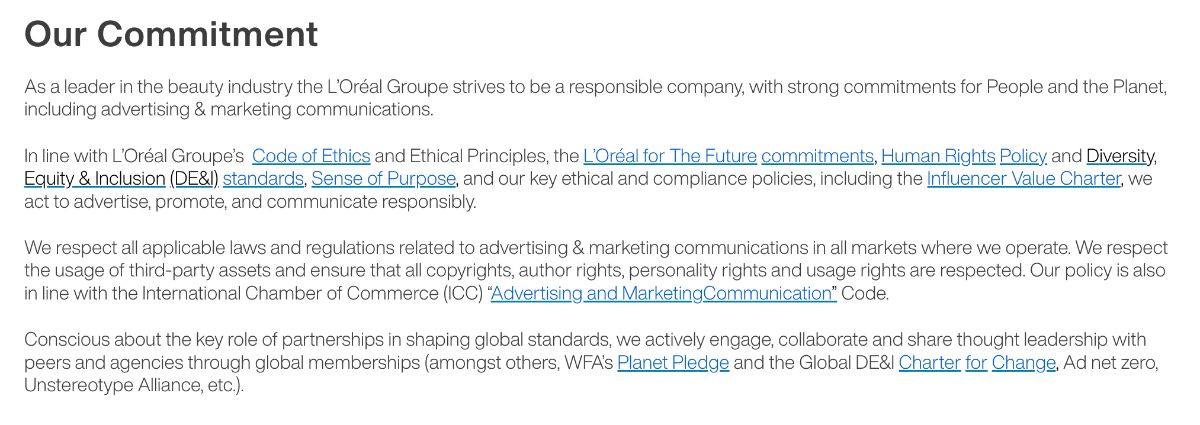Social media has become one of the main ways we share information today, having billions of users worldwide.
Due to social media increase, many businesses have a digital media presence which they use to communicate with their customers and promote their products and services.
While it’s an excellent way for businesses to increase revenue and promote their brand, it can be a quick downfall if not used correctly.
That’s where a social media policy comes into place, as it sets guidelines for how social media should be used in a company.
In this article, we’ll explain the true meaning of social media policy and give you real-life examples of successful policies (plus a free template that you can use to make your workplace social media policy).

- Social media policy establishes guidelines for employees in terms of their social media activities.
- With a social networking policy, you can protect your brand and ensure employee confidentiality.
- Social media policies should include purpose, scope, employee guidelines, and disciplinary actions.
- Famous companies such as Coca-Cola, Intel, and L’Oréal all use digital media policies.
What is a corporate social media policy?
A social media policy is a document that provides instructions for your employees regarding their activities on social media platforms. This code of conduct protects your brand by giving employees a clear framework on how to behave on social media without damaging the company’s reputation.
Although activities like commenting or posting online might seem harmless, irresponsible online behavior from your employees’ end can hurt your company’s image. For example, an employee might post a political opinion that offends minorities, leading to backlash against the company.
Our expert contributor, Alex Adekola, has extensive experience in mitigating negative online information. Here are his thoughts on how employees should behave online:

“Employees should know that whatever they publicly post online can affect your brand’s image. It’s important that, even with personal posts, they’re mindful of your company’s values and policies before posting any opinion that may be considered polarizing or too sensitive.”
As Alex mentioned, employees should be mindful of what they post, and with a social media policy, your employees will know what they can and can’t do on social media.
In addition, social media policies also provide directions on how your employees should handle the company’s social media accounts. This will ensure that your brand is protected, and that you only share information that can benefit your company.
How does having a social media policy benefit your business?
A well-crafted policy shields your business from any risks concerned with employee social media use in the workplace:
- Protects your brand identity,
- Ensures confidentiality, and
- Reduces liability.
Now, let’s look at the benefits of having a social media policy within your organization in more detail.
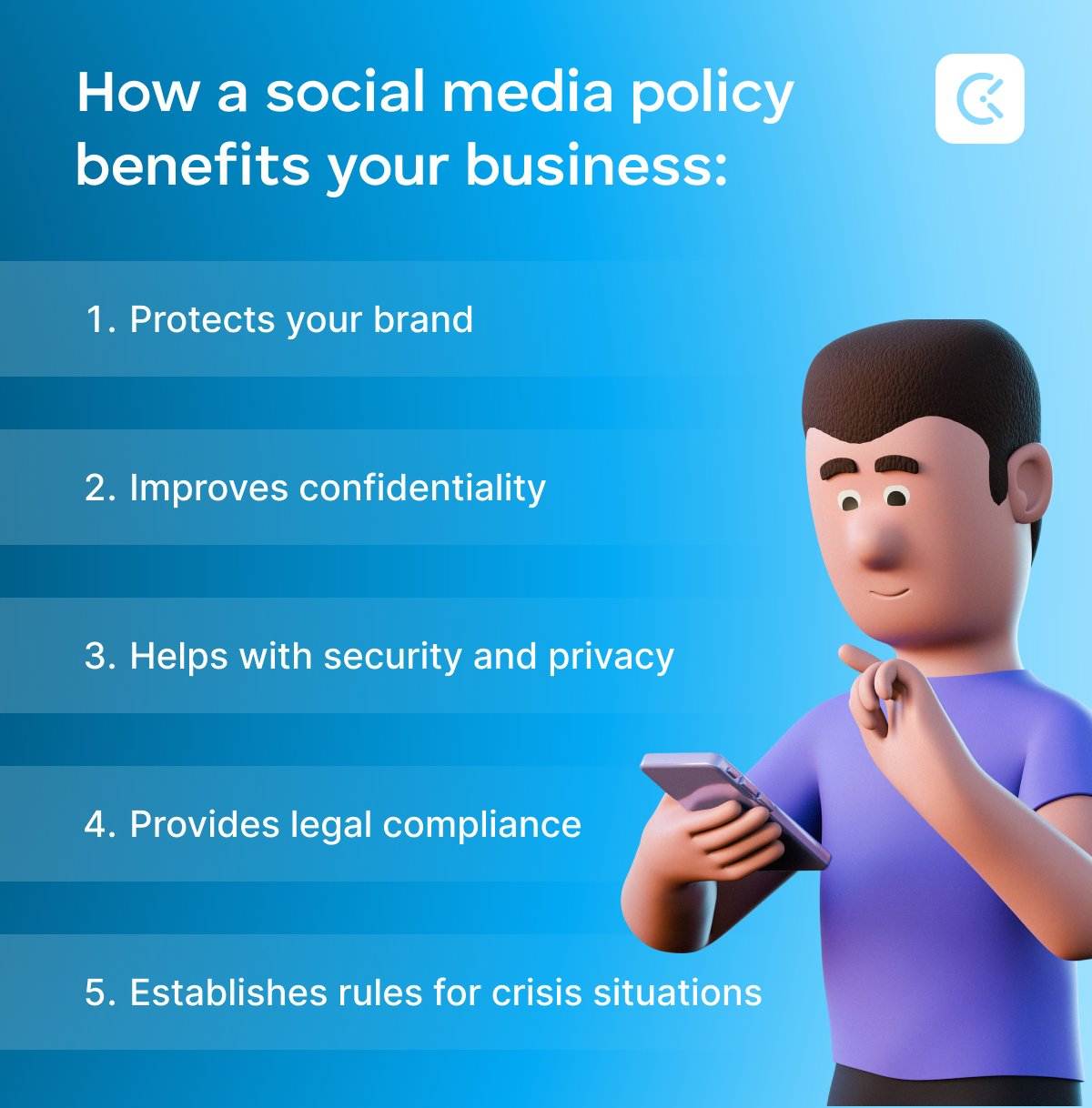
Benefit #1: It protects your brand
Building a strong brand can take years, but it only takes a few careless social media posts to mess it up. Your employees’ social media presence may have an influence on your company online, as their online activities can be linked to your brand — whether you intend it or not.
A digital media policy for employees sets clear brand guidelines and boundaries for what opinions they can share and ensures that your brand’s message stays consistent.
For example, you might want to discourage your employees from commenting on sensitive topics or require them to put disclaimers on their personal posts, which may publicly clarify that opinions are their own and don’t represent the company’s views.
Moreover, if an employee mentions your brand in one of their posts, you should instruct them to use the official logo, font, or anything else that is connected to your brand.
Benefit #2: It improves confidentiality
Employees often handle confidential information throughout their work, and it’s in your best interest that this stays strictly within the company.
Suppose you are preparing a unique campaign for Black Friday, only for an employee to post it on Instagram, giving your competitors time to copy your idea and devastate your campaign.
Situations like this are more common than you think, but with a workplace social media policy, you can minimize these risks. You can do this by letting your employees know what company information they can and can’t share on social networks.
Moreover, you can take this further by using a secure messaging app for team communication, guaranteeing that no information gets leaked and shared without your permission.
🎓 Learn how to keep all communication inside your company secure with our article — Email Frauds Cost Businesses 3 Billion Dollars: Here’s How to Make Your Business Communication More Secure
Benefit #3: It helps you with security and privacy
Security and privacy breaches can seriously harm your company, and social media can often be a weak point.
For example, an employee who manages your company’s social media platforms might click on a phishing link, allowing scammers to access your information and hijack your profiles. This can have severe consequences for your business and cost you a lot of money, too.
With a social networking company policy, you can establish safety protocols to minimize the risks of phishing attacks of all kinds. You can do this by making your employees aware of these attacks and requiring them to use a 2-factor authentication or a VPN during work hours.
Using something like a 2FA adds an additional layer of security as it requires an e-mail or phone number verification when someone tries to log in.
Benefit #4: It provides legal compliance
Every company needs to keep its customer’s privacy and personal data as a top priority. Customers give you a lot of sensitive data, such as personal information, credit card details, and much more. You are responsible for keeping this information safe and staying compliant with privacy laws, such as the General Data Protection Regulation (GDPR) law in the EU.
With a social media employee handbook, your employees will know how to handle customer information and prevent data leaks. By setting clear policies, you can avoid facing legal penalties and losing consumer trust.
Benefit #5: It establishes rules for crisis situations
Preventing PR crises is not an easy task, and there will come a time when a crisis will occur in your company eventually.
With a social media policy, you can prepare employees to respond appropriately and help your company avoid an unnecessary PR disaster.
You can include a section instructing employees on how to behave in crises and what to say to avoid negative PR. For example, you can instruct employees to avoid commenting if a negative event occurs (e.g., customer data leaks) and assign PR representatives.
This keeps your company united and stable in difficult circumstances.
What should you include in your social media policy?
Now that you know what a corporate social media policy is (and its importance), it’s time to go over the key elements that every social media policy for employees should contain.
#1 Definition of social media
If you want your policy to be successful, you should first define what your company considers as social media.
Social media can be defined as any technology that lets users share content online and communicate. This includes social media platforms such as Instagram, Twitter, or LinkedIn, but it also includes blogs and forums where users can leave comments.
#2 Purpose and scope of the policy
Having a purpose tells your employees the reasons behind your social networking policy. This purpose needs to be transparent, and you should explain the policy’s benefits to employees.
The scope of your policy tells the employees to whom the policy refers. Usually, a social media policy will cover all employees, from C-suite executives to regular employees. However, sometimes, it can also include freelancers and part-time employees.
Keep in mind that you should never violate the privacy of your employees and that you must have a balance between your expectations and employee freedom.
#3 Brand guidelines
In this part, you’ll inform your employees how your brand should be represented online and what key brand features must be respected. Employees can either do this while managing the company’s official account or when mentioning it from their personal accounts.
Brand guidelines can include the following:
- Brand logo,
- Tone of voice,
- Brand fonts,
- Brand message, and more.
By respecting brand guidelines, your brand will look constant and professional on all social media platforms.
#4 Rules for personal social media use
While your employees can post whatever they want on their personal social media accounts, it’s your responsibility to set policies for what you can and can’t tolerate as a company.
Your policy can include the following rules:
- No harassment, hate speech, or cyberbullying,
- Employee’s posts don’t reflect the company’s views,
- The company’s intellectual property can’t be shared without permission,
- No negative comments about the company,
- Employees must respect state and federal laws when posting,
- No sharing of client-related information, and
- No discussion of the company’s legal matters.
#5 Security protocols
With security protocols in place, you minimize the risks of data breaches and other dangerous events. In this part of your policy, you can instruct employees on how to avoid hacker attacks and what to do if something like that happens.
You can instruct employees on:
- How often they should change their social media passwords,
- What websites they should avoid visiting, and
- What security measures they should take (e.g., using an antivirus, a VPN, or a 2-step authentication).
If your employees use business equipment for personal reasons, this section should also explain how they should use it to avoid security breaches.
#6 Disciplinary actions
If you want your employees to respect your social media policy, they must be aware that there are consequences for violating it, including termination of employment.
The consequences for violations can vary, and they can go from a simple warning for minor offenses to hefty fines or even contract termination for more severe infringements.
Free social media policy template
To make it easier for you to create your own social media policy, we’ve created a free template that you can use. The template is quite straightforward, and you can modify it according to your needs.
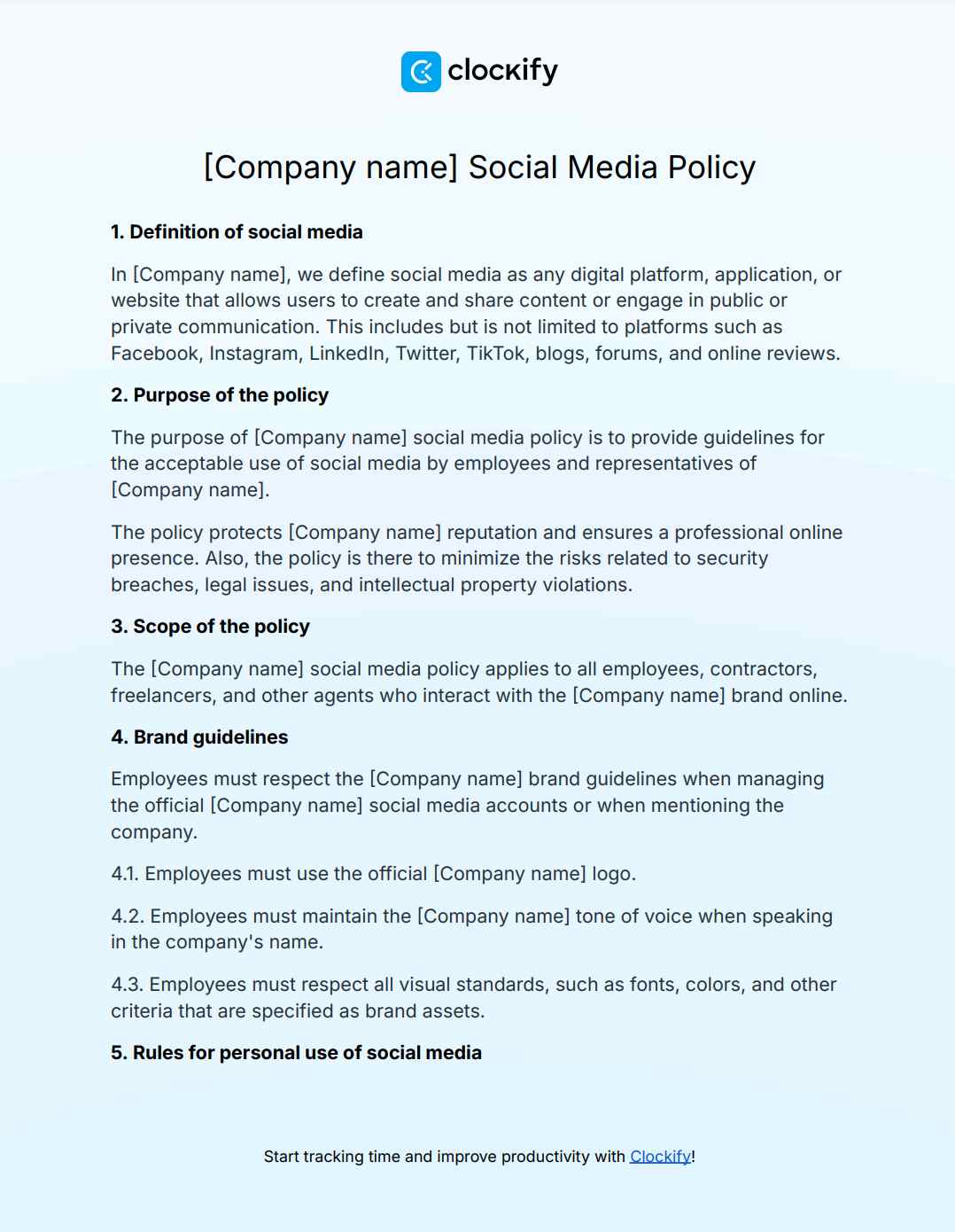
⬇️ Download our FREE social media policy template
Social media policy examples
To help you create a social media policy, we’ll share several examples of well-known companies and their policies.
Coca-Cola’s social media policy
It shouldn’t come as a surprise that a brand like Coca-Cola has its own social networking policy. This policy aims to promote relevancy, respect, and individual rights as the primary purpose of their digital media approach.
The policy has several principles, such as:
- Ensure quality,
- Foster respect,
- Protect people,
- Survey platforms, and
- Provide transparency.
Intel’s social media policy
Another big company with a digital media policy is Intel. Their policy is simple, as they want their employees to use social media positively. To do this, employees should follow 3 requirements:
- Be upfront,
- Emphasize good points of Intel’s products and goods, and
- Utilize their own judgment.
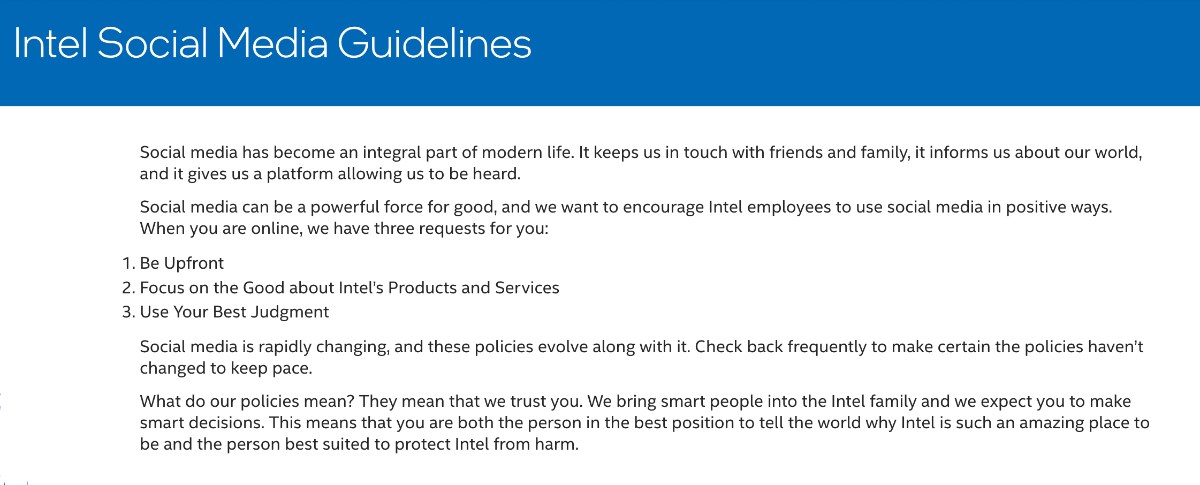
L’Oréal’s social media policy
The famous personal care brand also advocates responsible social media use and states that it respects all copyright and marketing laws regarding advertising online. They also advise their partners and influencers to do the same.
Frequently asked questions about social media policies
To make this guide as comprehensive as possible, we’ve included an FAQ section where we’ll answer the most common questions regarding this topic.
Can my employer tell me what I can and can’t post on social media?
Not directly. Employers can’t tell their employees what they can and can’t post on their social media accounts, but they can set guidelines and tell them what is appropriate according to the company’s policy and what isn’t.
What is an example of an employee violating social media guidelines?
An example of an employee violating a social media policy is an employee who posts confidential company information without the company’s approval. Another example is an employee who insults the company publicly on social media.
How do you write a good social media policy?
To write a successful social media policy, you’ll need to include information such as:
- Definition of social media,
- Roles and responsibilities,
- Rules for social media use,
- Security protocols, and
- Disciplinary actions.
To ensure that your social networking policy is high-quality, contact a legal advisor to assist you.
Use Clockify to limit social media use at work and boost employee productivity
As someone who writes for a living, getting distracted is one of the worst things that can happen to me during work.
And what is the biggest distraction out there? You guessed it right — social media!
We all know the feeling of just “replying” to a message on Facebook and then watching pointless online videos for the next 10 minutes. Embarrassing, I know.
Well, this also happens to your employees, and if you don’t prevent it in some way — you’ll have a group of unproductive individuals who can’t stay focused on one thing for more than 20 minutes.
So, how can you fix this? It’s actually easier than you think — start tracking time with Clockify!
Clockify is one of the most reliable time trackers out there, and it allows you and your employees to track work activities and improve productivity.
Tracking time with Clockify is quite straightforward:
- Write down what you are working on,
- Put your phone away,
- Start the timer when you begin working, and
- Stop the timer when you’re finished.
And that’s it!
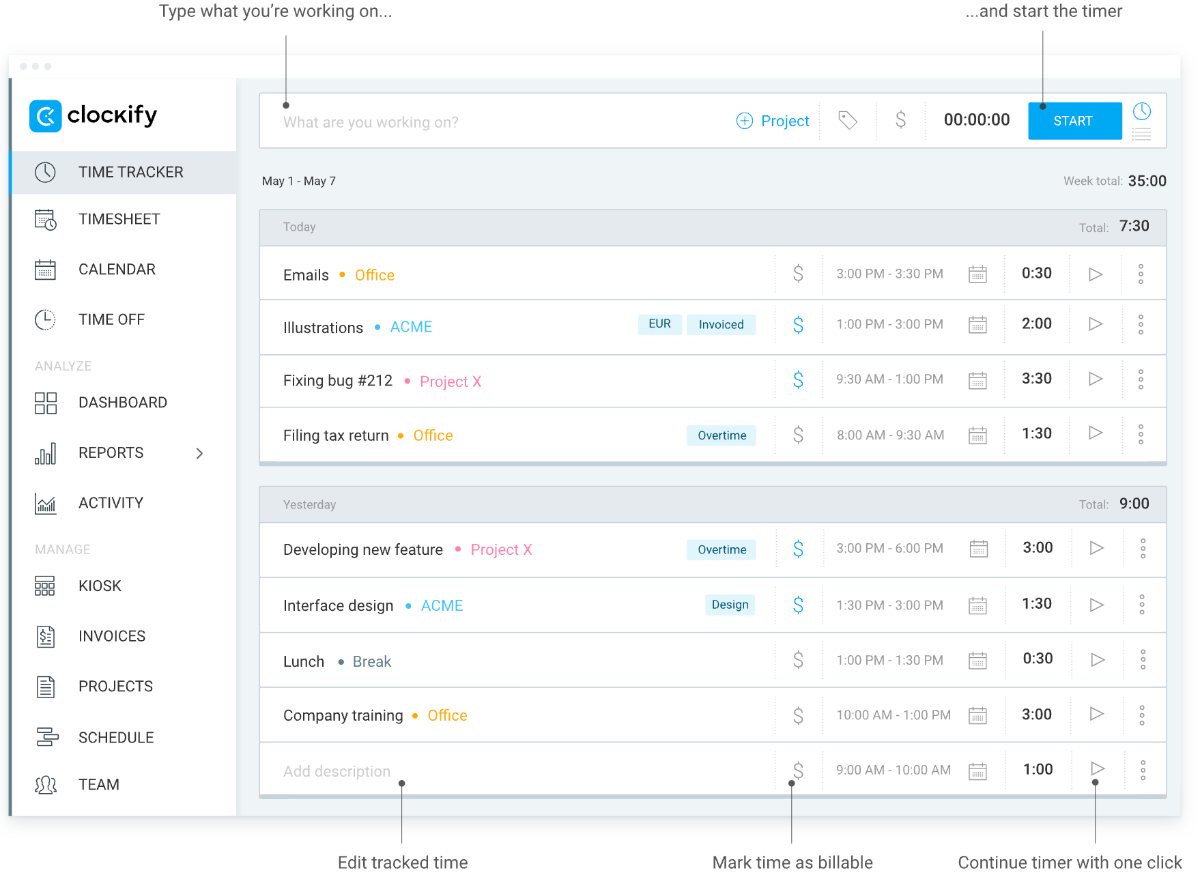
Clockify will automatically save all time entries, and you can later see how you and your employees spend time at work thanks to its detailed reporting system.
Oh, and did I mention that Clockify lets you use one of the most popular time management techniques for boosting productivity — the Pomodoro timer!
To learn more about Clockify’s Pomodoro timer, watch the video below.
Now that you know how a time tracker can help you and your team improve productivity, you can get Clockify for a single purchase of — nothing, it’s FREE!
Start tracking time and improve productivity!
How we reviewed this post: Our writers & editors monitor the posts and update them when new information becomes available, to keep them fresh and relevant. Published: December 17, 2024
Published: December 17, 2024 
